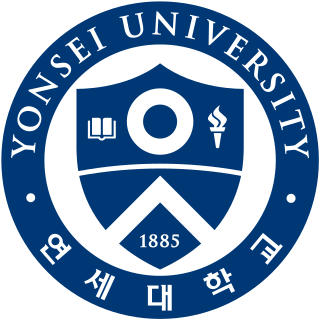
Yonsei University is a Christian private university in Seoul, South Korea. It is part of the SKY universities.

Ewha Womans University is a private women's research university in Seoul, South Korea. It was originally founded as Ewha Haktang on May 31, 1886, by a missionary Mary F. Scranton. Currently, Ewha Womans University is one of the world's largest female educational institutes and one of the most prestigious universities in South Korea. Ewha Womans University has produced numerous South Korean women leaders, including politicians, CEOs, and legal professionals.

Lee Yoon-hyung was a South Korean millionaire and daughter of Samsung Group chief Lee Kun-hee. She died by suicide by hanging herself in her New York City apartment on November 18, 2005, at the age of 26.
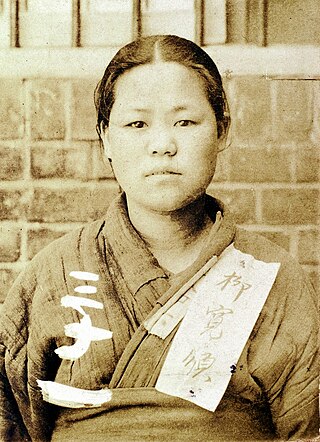
Yu Gwan-sun was a Korean independence activist. She is particularly notable for her role in South Chungcheong during the March 1st Movement protests against Japanese colonial rule. She has since become one of the most famous Korean independence activists and a symbol for the movement.
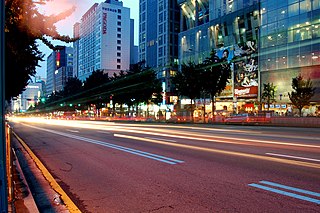
Seodaemun District is one of the 25 districts of Seoul, South Korea.

Sinchon-dong (Korean: 신촌동) is a neighbourhood and a judicial dong in Seodaemun District, Seoul, South Korea.
Chunghi Choo is a jewelry designer and metalsmith who was born in Incheon, Korea in 1938. She received a BFA degree from Ewha Womans University in Seoul, Korea, where she majored in Oriental painting and studied philosophy of Oriental art and Chinese brush calligraphy. She moved to the United States in 1961 to study metalsmithing, weaving, and ceramics at Cranbrook Academy of Art in Bloomfield Hills, Michigan, where she received an MFA in 1965.
Traditionally, Korean legal education followed the German and Japanese models. Recent reforms are shifting professional education from an undergraduate LL.B. to a postgraduate J.D. type of education. In addition, many Korean universities continue to offer legal education in academic and scholastic frameworks, offering graduate degrees, including Ph.D.s in Law. Further, several universities focus on legal systems outside of Korea, such as on Common Law.

Konkuk University Law School is one of the professional graduate schools of Konkuk University, formerly known as the College of Law. Located in Seoul, Republic of Korea, it is one of the 25 government approved law schools. It has the lowest student to faculty ratio in the country. It plans to specialize in real estates law and offers scholarship to all students. 50% of the students will receive half scholarship and the other 50% of the students will get full scholarship.
Ewha Womans University Press is a book publisher founded in 1949.

The College of Engineeringat Ewha Womans University is one of its eleven major academic divisions. Established in 1996, it has four departments: Computer Science, Electronics Engineering, Environmental Science, and Architecture. The college currently offers B.S., M.S., and Ph.D. degrees.
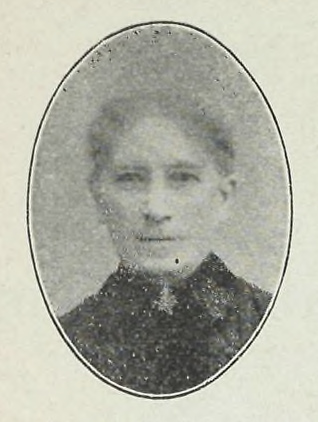
Mary Fletcher Benton Scranton was an American Methodist Episcopal Church missionary. She was the first Woman's Foreign Missionary Society of the Methodist Episcopal Church representative to Korea and the founder of the Ewha Girls School under Emperor Gojong. Today, the Ewha Girls School is the Ewha Womans University, one of the most prestigious women's schools in Asia. Scranton also founded the Tal Syeng Day School for Women in Seoul and the Training School for Bible Women.
Seoul Arts High School, also known by the Korean-language abbreviation Yego, is a private arts high school located within Pyeongchang-dong, Jongno District, in Seoul, South Korea.

Almost all South Korean secondary students wear a prescribed school uniform, gyobok. The majority of elementary schools except some private elementary schools do not have uniforms; however, the uniform is strictly enforced from the start of middle school and up. A typical South Korean uniform usually consists of a shirt, blazer and tie, with skirts for girls and trousers for boys. More recently, the uniform is often worn by celebrities who target the younger, teen audience to sell entertainment products. The school uniform and school setting is frequently used as a venue for romance. As a result, the uniform has become something akin to an expression of fashion among students.

Jasper Kim is an attorney, author, media contributor, professor, and expert in international business law, negotiation strategy, and contemporary East–West issues and trends from a socio-economic and legal (interdisciplinary) perspective.
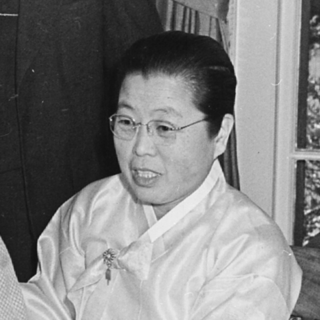
Helen Kim was a South Korean politician, educator, social activist, and feminist. Her art name was Wuwol (우월). Kim was the founder of the World Federation of Methodist and Uniting Church Women (WFMUCW), and the daily Korean newspaper, The Korea Times.

Mary C. Kim Joh, also known as Che Sik Cho, was a Korean-American music composer, academic and medical research scientist. Joh is best known for writing "School Bell" in 1945. This children's song is taught to pre-school students in South Korea.
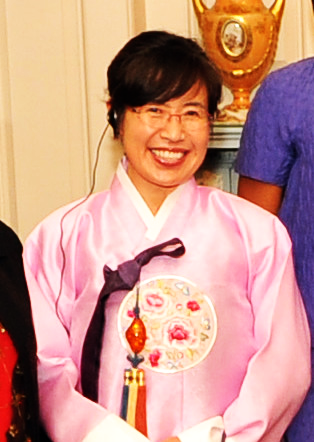
Lee Ae-ran is an activist. After her grandparents defected to South Korea, she and her family were sent to a North Korean labor camp. She was imprisoned for eight years. In 1997, she ran away to South Korea after an American relative published a memoir stating that Lee's father was involved in anti-regime efforts.

Ewha Girls' High School is a private girls high school located in Jeong-dong, Jung-gu, Seoul, South Korea. Although managed by the same foundation, it is not to be confused with the coeducational Ewha Womans University High School, which is located near Ewha Woman's University in Seodaemun District and functions as the demonstration school attached to the university's College of Education.

Ewha Haktang is a Korean secondary education institution established in 1886 in Hansung-bu, Joseon, and is one of the earliest women's education institutions in Korea. The school name Ewha comes from EwhaHaktang and is the forerunner of Ewha Womans' University and Ewha Girls' High School. It is also the alma mater of independence activist Yu Gwan-sun.















